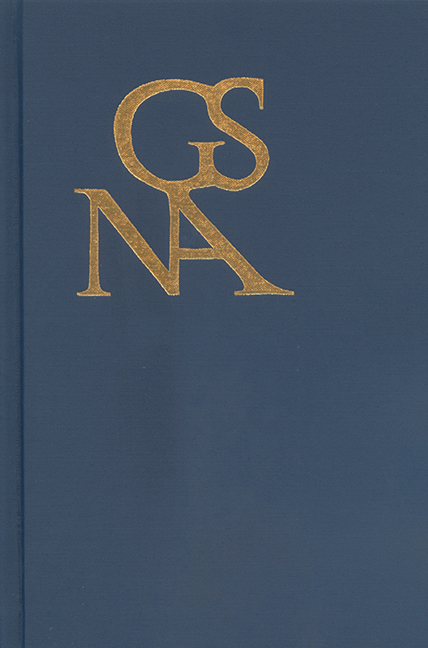Book contents
- Frontmatter
- Contents
- Special Section on Goethe and the Postclassical: Literature, Science, Art, and Philosophy, 1805–1815
- Helena, Then Hell: Faust as Review and Anticipation of Modern Times
- Histrionic Nationality: Implications of the Verse in Faust
- Die Wette in Goethes Faust
- Ecocriticism, the Elements, and the Ascent/Descent into Weather in Goethe's Faust
- Grablegung im Vorhof des Palasts: Groteske Anschaulichkeit in den vorletzten Szenen von Faust II
- Goethes Gnostiker: Fausts vergessener Nihilismus und sein Streben nach Erlösungswissen
- The Unconscious of Nature: Analyzing Disenchantment in Faust I
- Forms of Figuration in Goethe's Faust
- Goethe's Morphology of Knowledge, or the Overgrowth of Nomenclature
- Paraphrasis: Goethe, the Novella, and Forms of Translational Knowledge
- Dramas of Knowledge: The “Fortunate Event” of Recognition
- gegen: Bewegungen durch Goethes “Der Mann von funfzig Jahren”
- “Offenbares Geheimnis” oder “geheime Offenbarung”? Goethes Märchen und die Apokalypse
- Goethe's Green: The “Mixed” Boundary Colors in Zur Farbenlehre
- For Heaven's Sake, I Will Have You Walk into the Dark: Grillparzer's Containment of Beethoven and the Ambivalence of Their Melusina Project
- Imitation, Pleasure, and Aesthetic Education in the Poetics and Comedies of Johann Elias Schlegel
- Feindlich verbündet: Lessing und die Neuen Erweiterungen der Erkenntnis und des Vergnügens
- Juvenalian Satire and the Divided Self in Goethe's “Das Tagebuch”
- Book Reviews
Dramas of Knowledge: The “Fortunate Event” of Recognition
from Special Section on Goethe and the Postclassical: Literature, Science, Art, and Philosophy, 1805–1815
Published online by Cambridge University Press: 14 March 2018
- Frontmatter
- Contents
- Special Section on Goethe and the Postclassical: Literature, Science, Art, and Philosophy, 1805–1815
- Helena, Then Hell: Faust as Review and Anticipation of Modern Times
- Histrionic Nationality: Implications of the Verse in Faust
- Die Wette in Goethes Faust
- Ecocriticism, the Elements, and the Ascent/Descent into Weather in Goethe's Faust
- Grablegung im Vorhof des Palasts: Groteske Anschaulichkeit in den vorletzten Szenen von Faust II
- Goethes Gnostiker: Fausts vergessener Nihilismus und sein Streben nach Erlösungswissen
- The Unconscious of Nature: Analyzing Disenchantment in Faust I
- Forms of Figuration in Goethe's Faust
- Goethe's Morphology of Knowledge, or the Overgrowth of Nomenclature
- Paraphrasis: Goethe, the Novella, and Forms of Translational Knowledge
- Dramas of Knowledge: The “Fortunate Event” of Recognition
- gegen: Bewegungen durch Goethes “Der Mann von funfzig Jahren”
- “Offenbares Geheimnis” oder “geheime Offenbarung”? Goethes Märchen und die Apokalypse
- Goethe's Green: The “Mixed” Boundary Colors in Zur Farbenlehre
- For Heaven's Sake, I Will Have You Walk into the Dark: Grillparzer's Containment of Beethoven and the Ambivalence of Their Melusina Project
- Imitation, Pleasure, and Aesthetic Education in the Poetics and Comedies of Johann Elias Schlegel
- Feindlich verbündet: Lessing und die Neuen Erweiterungen der Erkenntnis und des Vergnügens
- Juvenalian Satire and the Divided Self in Goethe's “Das Tagebuch”
- Book Reviews
Summary
I. “Glückliches Ereignis” as Anagnorisis Scene
The autobiographical reflection, “Glückliches Ereignis,” is Goethe's account of an encounter with Schiller in 1794 that changed the way the two men saw each other and led to the friendship that would permanently alter their lives. It was not published until 1817, some 21 years after the scenario described and 12 years after Schiller's death, and it conceals or glosses over several important details of the events leading up to and following the fateful meeting. Schiller, for instance, had already made generous overtures to Goethe in writing and through the intervention of mutual friends during the months preceding their first conversation in Jena. Goethe had in fact already agreed to contribute to Schiller's pet project, Die Horen, though in the narrative the invitation and its acceptance come about as a result of the described encounter. Goethe also seems to conflate several different discussions that took place in Jena in July and September in the one episode he recounts. Even their meeting, which Goethe presents as spontaneous, unexpected and coincidental, was pre-arranged by Schiller and his friends as a way to jump-start the intended rapprochement. I do not contend that Goethe misrepresented the nature of his relations prior to and following the meeting in Jena—no one can deny that a real antipathy existed between the two writers in the years before 1794, and that a rich and productive friendship blossomed between them in the decade thereafter. As we can read in carefully researched biographical accounts and the primary sources collected by Grumach, or even just the first few letters of Goethe's correspondence with Schiller, however, it becomes clear that the ill will, harbored grudges, and mutual suspicion dissolved slowly, and that the friendship—though truly dramatic in its reversal— grew by faltering steps rather than in a momentary about-face. I suggest instead that “Glückliches Ereignis” merely rearranges a few details in order to present the process of the change from hostility to friendship in the instant singularity of a tableau.
Goethe's account presents us with a tale of sudden and fortuitous turn-around from extreme antipathy to deep and meaningful friendship, and from artistic barrenness to fruitful productivity. The text records Goethe's disappointment and lethargy in the years directly following his return from Italy: he feels “gelähmt”: “die Betrachtung der bildenden Kunst, die Ausübung de Dichtkunst hätte ich gerne aufgegeben, wenn es möglich gewesen wäre.”
- Type
- Chapter
- Information
- Goethe Yearbook 17 , pp. 203 - 222Publisher: Boydell & BrewerPrint publication year: 2010

